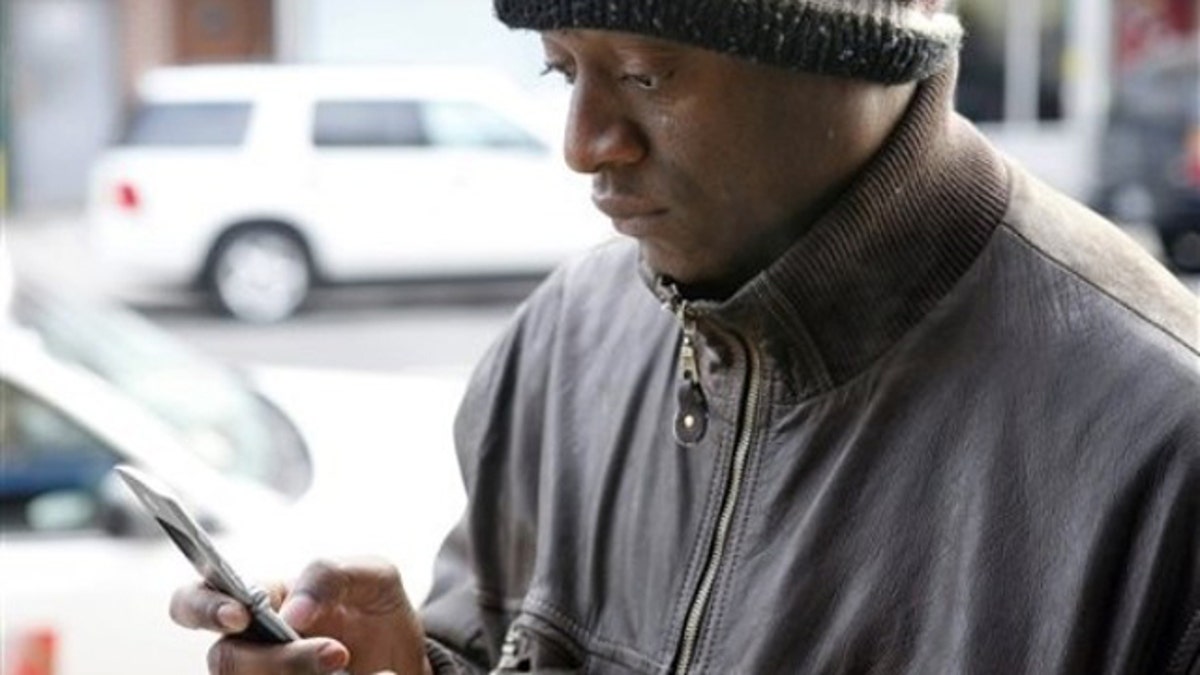
Bernard Toussaint, originally from Port-au-Prince, Haiti, tries to reach his mother in Haiti on his cell phone in New York, Wednesday, Jan. 13, 2010. The International Red Cross says a third of Haiti's 9 million people may need emergency aid and that it would take a day or two for a clear picture of the damage to emerge from Tuesday afternoon's magnitude-7.0 earthquake. (AP Photo/Seth Wenig) (AP Photo/Seth Wenig)
A federal appeals court Friday debated a privacy issue you probably hadn't considered: the government's ability to track your location at any time, if you carry a cell phone.
As cell phones have morphed from cordless communication devices into pocket-sized PCs, cellular providers have developed and honed the ability to pinpoint your location fairly accurately -- potentially to within 150 feet. This helps network operators connect your phone to the nearest cell tower and locate you in an emergency, a federally mandated feature called E9-1-1.
That feature could be a lifesaver if your car runs off a rural road on a dark night. But it also enables the authorities to know your location at all times when you're carrying your phone.
"Most people don't understand they are carrying a tracking device in their pockets," Kevin Bankston, a lawyer with the Electronic Frontier Foundation, told Newsweek.
The U.S. Court of Appeals for the 3rd Circuit in Philadelphia heard arguments on Friday in a case that centers around Philadelphia FBI agent William Shute, who testified that he obtained records 150 times in recent years to track the location of federal fugitives.
The Electronic Frontier Foundation and the American Civil Liberties Union argued in court Friday that the practice raises serious privacy issues. And third U.S. Circuit Judge Dolores Sloviter seemed to share that concern.
"There are governments in the world that would like to know where some of their people are or have been," Sloviter challenged Justice Department lawyer Mark Eckenwiler, an associate director of criminal enforcement operations.
"Can the government assure us that it will never try to find out these things?" she asked. "Don't we have to be concerned about this? Not this government right now, but a government?"
Location information is generated when you place a call on your cellular phone; most carriers store that data for a period of time, which varies by carrier.
They don't store the information for long, and they also don't track your location when you're not making calls. But they easily could, says PCMag.com cell phone analyst Sascha Segan.
"At any moment, if your cell phone is on, your provider can tell where you are. Right now, they don't store that bit of information. But if the government makes that a legal requirement, they might have to."
It's technically feasible, Segan explains, and it's not discussed in your cell phone contract. Contracts detail certain privacy regulations, but all are subject to government laws and regulations. A change in the law would supersede your contract.
The Fourth Amendment guards against illegal search and seizure and will be cited frequently in Friday's case, but the "right to privacy," while implied in the Constitution, is not explicitly guaranteed, explains Dr. Abbe Forman, a professor and digital ethics expert with the computer and information science department at Temple University's College of Science and Tech.
"Many Americans believe that the Constitution guarantees us the 'right to privacy,' but that's not the case," Forman warned.
She said tracking is a critical tool in emergencies, but she worries that the government may play upon our fears to enhance its snooping powers.
"If we tell people they will be safer because they can be found in case of emergency, most people will look no further for information, even though the great majority of them will never be lost to that extreme," she said.
After Friday's hearing, Senate Judiciary Chairman Patrick Leahy, D-Vt., chief author of the 1986 law, said his committee would revisit the legislation this year.
"The question of how best to protect these digital communications, while providing law enforcement with the tools that it needs to keep us safe, has no simple answer. But, what is clear is that our federal electronic privacy laws are woefully outdated," Leahy said in a statement.
Of course, you can always turn off the tracking by simply turning off your cell phone. And if a criminal picks up a new pay-as-you-go cell phone at the corner store rather than one with a contract -- and then throws it away a day later -- the government won't be able to keep up with the IDs on those phones.
"These cases therefore revolve around stupider criminals," jokes Segan, "the ones who keep a single cell phone and have a monthly relationship with a carrier."
The Associated Press contributed to this report.
